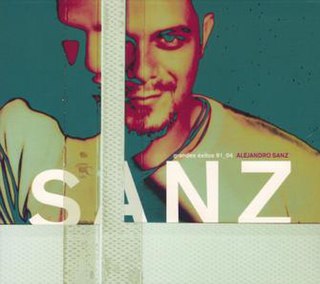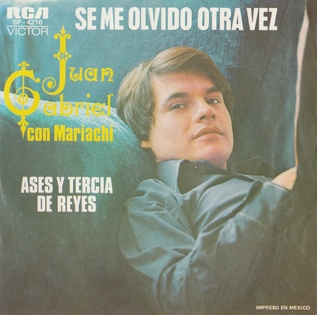The topic of this article may not meet Wikipedia's notability guideline for music .(March 2024) |

Juan Bau (Aldaia; 24 December 1948) is the stage name of Juan Bautista Conca Moya, a Spanish light music singer. [1]
The topic of this article may not meet Wikipedia's notability guideline for music .(March 2024) |

Juan Bau (Aldaia; 24 December 1948) is the stage name of Juan Bautista Conca Moya, a Spanish light music singer. [1]
In 1972 he made his professional debut as a solo artist under the name of Juan Bau and recorded his first single album with the songs 'Pequeñas cosas' and 'Dentro de mi alma', which he composed himself.
In 1973 he released his second single with "Tú no comprendes" and "Sigue tu camino". It was also in this year that he had his big hit with the song "La estrella de David". [2] In 1974 he received his first gold record with the album Penas. [3] Other songs include 'Mi corazón' in 1974, 'Dama del amanecer', 'Natacha y yo' in 1975, 'Acaríciame', 'Fantasía' in 1976 and the super hit with which he almost always starts his live performances, 'Devuélveme el amor' in early 1978. In the 80s there were songs such as "Un paso más", "Hoy me llamará", "Soñaré", "Me gusta así", "Libérate", [4] and "Con las luces apagadas".
After a few years without recording, he released the album Corazonada in 1986, followed by the CD Alma romántica and, in 1999, Nuestras canciones, in which he covered hits by Mocedades, Manuel Alejandro, Sergio and Estíbaliz and José Luis Perales.
In 2003 he released the album Volverte a ver. [5] In 2004 he released the album 30 Años de Éxitos and in 2009 the compilation Super Éxitos de Juan Bau. [6]

Los Temerarios are a Mexican Grupera band from Fresnillo, Zacatecas, started in 1977 by brothers Adolfo Angel and Gustavo Angel and their cousin Fernando Angel. During their early years, they were known as Conjunto La Brisa.
Danny Rivera is a singer and songwriter born in San Juan whose career spans nearly 50 years. He is well known in Puerto Rico for his political activism. In 2008, Rivera acquired Dominican Republic citizenship. After 12 years of work, Danny Rivera and Nelson González in 2014 finished work putting new life into the classical bolero - in Spanish. Rivera and González Hit the Heart of the Latin American Song Book on Obsesión

Rigoberto Tovar García, better known as Rigo Tovar, was a Mexican musician, singer and actor. Famous for his cumbias, Tovar infused traditional Mexican and Latin music with modern instruments like the electric guitar and synthesizer and popular styles such as rock and soul music.

María de los Ángeles de las Heras Ortiz, better known professionally as Rocío Dúrcal, was a Spanish singer and actress. Her career spanned more than four decades and 50 albums. She successfully performed pop music, bolero, mariachi and romantic ballads. She was one of the greatest and most famous Hispanic singers of all time, widely successful in Mexico and Latin America, she earned the sobriquet of Reina de las Rancheras.

Mi Sangre is the third studio album by Colombian singer-songwriter Juanes, released on September 28, 2004.

Nena Daconte is a Spanish pop band created and led by singer and composer Mai Meneses in Barcelona circa 2005. The band takes its name inspired by a character from the short story "The Trail Of Your Blood On The Snow", by Gabriel García Márquez.

Leopoldo Dante Tévez, known as Leo Dan, is an Argentine composer and singer born in Villa Atamisqui, Santiago del Estero Province. He recorded more than 20 albums during his long career during the late 20th century between Argentina and Mexico. His appreciation for Mexican music led him to record with mariachis, and from there, he went to international fame. His music was well received by the Mexican public since his voice was a good match to the traditional mariachi sound.

Grandes Éxitos 1991–2004 is the first greatest hits album from Spanish singer-songwriter Alejandro Sanz. The album assembles his previous hits in two CDs; the first contains songs from 1991 to 1996 of the albums Viviendo Deprisa, Si Tú Me Miras, Básico and 3 and the second the hits from 1997 to 2004 of the albums Más, El Alma al Aire, MTV Unplugged and No Es lo Mismo. For this album, Sanz recorded two new songs, the single "Tú No Tienes Alma" and "Cuando Sea Espacio".
The discography of Mexican recording artist Thalía, consists of 18 studio albums, 24 compilation albums, two live albums and 70 singles. She has also sung in Portuguese, French and Tagalog, apart from Spanish and English, in order to promote her music in other music markets. Thalía's popularity was further enhanced by her telenovelas, that were broadcast in over 180 countries, giving her the chance to create a solid fan base in many countries and gain stardom mainly by Spanish recording records. Her records have sold in markets that Latin stars don't normally sell such as China, Yemen, and the Philippines.

Papito is an album released by Spanish pop singer Miguel Bosé to celebrate his 30 years in the Music industry. The album includes 14 tracks of previously known hit songs by the artist, in reworked versions in collaboration with many artists including Juanes, Shakira, Amaia Montero, Ricky Martin, Laura Pausini, Paulina Rubio, Alaska, Julieta Venegas, Michael Stipe, Bimba Bosé, David Summers, Ivete Sangalo and Italian singer Mina.
Éxitos may refer to:

Hernaldo Zúñiga is a Nicaraguan singer-songwriter. He was born in Managua, but spent his childhood and adolescence in Masaya.
Leonardo Paniagua is one of the Dominican Republic's most popular bachata musicians. He emerged from obscurity to overnight stardom in the 1970s, when he recorded his first 45rpm record, "Amada, Amante" for Discos Guarachita.

"Se Me Olvidó Otra Vez" is a song written and performed by Mexican singer-songwriter Juan Gabriel for his fourth studio album, Juan Gabriel con el Mariachi Vargas de Tecalitlán (1974). The song is a ranchera number that tells of an impossible reunion as the singer forgets he is the only one who loved a woman. It was released as the lead single from the album in 1975. The song has been listed as among Juan Gabriel's best songs according to music critics and was one of the best-performing singles of 1975 in Mexico. Gabriel has re-recorded the song twice, the first for his compilation album, Por Los Siglos (2001), and as a duet with fellow Mexican singer-songwriter Marco Antonio Solís on his 28th studio album, Los Dúo (2015).

Rolando Alarcón Soto was a Chilean singer-songwriter and teacher, who was one of the main figures of the movement Nueva canción chilena. He was the artistic director of Cuncumén, one of the most important Chilean folk groups in the 20th century. During the 1970s, Rolando was a political activist for the Popular Unity of the socialist president Salvador Allende.

Guillermina Jiménez Chabolla known professionally as Flor Silvestre, was a Mexican singer and actress. She was one of the most prominent and successful performers of Mexican and Latin American music, and was a star of classic Mexican films during the Golden Age of Mexican cinema. Her more than 70-year career included stage productions, radio programs, records, films, television programs, comics and rodeo shows.

Claudia Alejandra Menkarski, known as Claudia Brant, is an Argentine composer, producer and singer in diverse genres and multiple languages.

Grandes Éxitos de Juan Luis Guerra y 440 or simply Grandes Éxitos is a compilation album of Dominican singer-songwriter Juan Luis Guerra, and his band 440 released in July 1995 by Karem Records. It contained Guerra's fifteen biggest hits from 1988 to 1994 on the original version and from the albums Mudanza y Acarreo(1985) to Fogarate! (1994) on the international versions. The compilation receive positive reviews by the critics.

"Si Tú Supieras" is a song written by Kike Santander and performed by Mexican recording artist Alejandro Fernández. It was co-produced by Santander and Emilio Estefan and was released as the first single from Me Estoy Enamorando by Sony Music Mexico on 18 August 1997. The song is a bolero-pop ballad with ranchera influences and portrays the singer yearning for his lover to know how much she means to him. A music video was made for the track and was used as the main theme for the Mexican telenovela María Isabel.
La la la is a 1986 double album in Spanish by Argentinian musicians Luis Alberto Spinetta and Fito Páez.